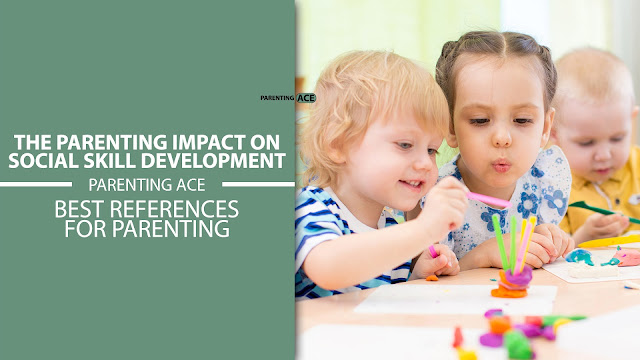The Impact of Parenting on Social Skills Development
In the intricate tapestry of child development, parenting stands as the master weaver, intricately crafting the social fabric that shapes a child's interactions and relationships. Social skills, the threads that bind individuals in harmonious communication and collaboration, are not innate but rather honed through the delicate dance of parenting. In this blog post, we embark on a journey to unravel the profound impact of parenting on the cultivation of social skills in children and adolescents. From the gentle guidance of authoritative parenting to the pitfalls of authoritarianism and permissiveness, we delve into how parental styles, practices, and behaviors shape the social competencies that pave the way for success and fulfillment in every stage of life.
 |
| The Parenting Impact on Social Skill Development |
Social skills, the abilities that allow individuals to interact effectively with others, are crucial for success in various aspects of life, including personal relationships, education, and career. While genetics and environmental factors both play roles in the development of social skills, parenting has a profound impact on shaping these crucial abilities in children. In this article, we'll explore how parenting styles, practices, and behaviors influence the development of social skills in children and adolescents.
Parenting Styles and Social Skills
Parenting styles, as described earlier, significantly influence a child's overall development, including their social skills. Authoritative parenting, characterized by warmth, responsiveness, and clear expectations, tends to foster the development of strong social skills in children. These children learn to communicate effectively, cooperate with others, and regulate their emotions due to the supportive environment provided by authoritative parents.
On the other hand, authoritarian parenting, with its emphasis on strict rules and obedience, may hinder the development of social skills. Children raised in authoritarian households may struggle with assertiveness, empathy, and conflict resolution, as they are less likely to have opportunities for open communication and negotiation.
Permissive parenting, marked by warmth but lack of structure and discipline, can also have mixed effects on social skills development. While children may feel comfortable expressing themselves in permissive environments, they may struggle with self-control and respect for boundaries, which are essential aspects of social interaction.
Lastly, uninvolved parenting, characterized by neglect or indifference, often leads to significant deficits in social skills. Children raised in such environments may lack the necessary social cues, emotional regulation, and interpersonal skills needed for healthy relationships and social interactions.
Parenting Practices and Social Skills
In addition to parenting styles, specific parenting practices also play crucial roles in shaping children's social skills. For instance, parents who model positive social behaviors, such as empathy, cooperation, and problem-solving, provide valuable lessons for their children. These children learn by example and are more likely to exhibit similar behaviors in their interactions with peers and adults.
Furthermore, parents who encourage socialization and provide opportunities for their children to engage with others in various settings, such as playdates, group activities, and community events, contribute to the development of robust social skills. Through these experiences, children learn important social norms, develop empathy, and refine their communication and interpersonal abilities.
Conversely, parents who overly criticize or punish their children for social mistakes may inadvertently undermine their confidence and willingness to engage with others. Fear of judgment or rejection can inhibit social exploration and experimentation, hindering the development of social skills in children.
Long-Term Impact of Parenting on Social Skills
The influence of parenting on social skills extends beyond childhood and adolescence, shaping individuals' social competencies well into adulthood. Adults who were raised in nurturing, supportive environments tend to exhibit stronger interpersonal skills, enjoy healthier relationships, and experience greater success in their careers and social lives.
Conversely, individuals who experienced negative or neglectful parenting may face challenges in forming and maintaining meaningful relationships, communicating effectively, and navigating social situations. These deficits can impact various aspects of their lives, from personal happiness to professional success.
In conclusion, parenting plays a pivotal role in the development of social skills in children and adolescents. Through their parenting styles, practices, and behaviors, parents influence how their children perceive, interact with, and relate to others. By fostering environments that promote empathy, communication, cooperation, and respect, parents can empower their children with the social skills necessary for success and fulfillment in life. Recognizing the profound impact of parenting on social skills development underscores the importance of providing support, guidance, and positive role modeling to nurture healthy social development in children.



Comments
Post a Comment